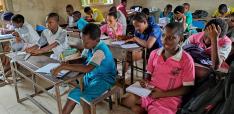Book Review: Complicit Sisters. Gender and Women’s Issues across North-South Divides

Complicit Sisters: Gender and Women’s Issues across North-South Divides. by Sara de Jong. Oxford University Press. 2017.
In recent years, feminist, postcolonial and decolonial theories have brought attention to the notion of empowerment as well as the concepts and politics of development, often criticising them as colonial tools. They argue that the prevailing logics of development do not promote cultural meeting points, because they are the projection of the ‘enlightened’ Global North that wants to help a marginalised Global South.
In Complicit Sisters: Gender and Women’s Issues across North-South Divides, author Sara de Jong questions the system of fixed categories proposed by hegemonic discourses of Northern-biased feminism – e.g. men/women, North/South, development/underdevelopment – that dehumanises certain Southern subjectivities by ignoring realities, perspectives and experiences and by limiting the agency, and so the autonomy, of subordinate subjects and communities. But the text contains an additional innovative feature: De Jong gives voice not only to ‘the subaltern’, but also to those women in the Global North who intervene in the Global South; explores how these women understand themselves (Chapters Two and Three); examines how they perceive relations with the women they are helping (Chapters Four and Five); and, finally, considers how they define ‘Otherness’ (Chapter Six).
The strength of Complicit Sisters resides in its methodological eclecticism: De Jong swings between an accurate historical account of transnational feminism and women’s organisations that operated in support of development policies (e.g. ‘Women in Development’, ‘Women and Development’ and ‘Gender and Development’ perspectives) and a rich gathering of individual narratives. Through interviews with women coming from diverse locations but united by a common criterion – they all work for (Northern) European NGOs across the North-South axis – the author makes clear what mere normative analyses can’t do alone: she shows the feelings of these women, how they perceive their experiences and their perspectives about their commitment.
For example, the concepts of global citizenship and (global) responsibility are located in the same paradigm through the prism of these voices: ‘theories on […] global citizenship are instructive in analyzing the motivation that the women saw as underpinning their work’ (46). When Tess, Liz and Frida – some of the interviewed women – are questioned about their motivation to work for a Northern NGO and their sense of responsibility in relation to the power and privileges they have, they all answer by appealing to the liberal idea of an ‘international justice’ and a sameness between women, regardless of their differences and distance. These three women feel responsible for others, because they have privileges and opportunities. They feel guilty about this, and NGO work helps to expiate this liberal guilt.
Responsibility is also defined across and in relation to space and distance in Chapter Four, with reference to rich and varied texts of decolonial and postcolonial feminisms and critical development literature. In this chapter, strategies used by women from the Global North to bridge distance with women from the Global South are debunked: field trips and derivative myths in fundraising, for example, reiterate the imaginaries through which marginalised, subordinated, peripheral women are seen to be aided by a dominant feminist epistemology that will take charge of saving them. These strategies exacerbate and stigmatise existing relations of power and lead to less open dialogue.
Something very interesting that also emerges from de Jong’s analysis is her statement concerning a ‘mutual dependency’ between organisations from the North and from the South: ‘Southern partner organizations are needed to legitimate the work of Northern (donor) organizations […] Partnerships are not only essential for the legitimacy of organizations and as sources of information, but also, in fact, as sources of motivation’ (113).
This mutual dependency, however, doesn’t imply that concepts of sisterhood and solidarity should be understood as universal or shared by all women. In Chapter Five, these forms of relationality are conceived by the interviewees in terms of a common victimhood and shared sense of oppression, when in reality they fit only the demands and needs of a specific category of women. De Jong’s suggestion makes reference once again to what decolonial feminists would call a ‘coalition’ approach: there is an ‘individual ‘‘work’’ that is needed to underpin the building of coalitions that are more sustainable than a sisterhood based on shared victimhood’ (156). It would lead us to know others as ourselves through alternative, grounded relationships, socialities and socialisations based on creative forms of defining power relationships. That’s why de Jong draws the attention to Sandra Harding’s feminist standpoint theory: the claim for homogenous and shared conceptions of women’s sisterhood, solidarity, victimhood and relationality do not take into account the situatedness of the Self and diverse knowledge backgrounds.
These interrogations of understandings of ‘Self’ and ‘Other’ lead the author to position her analysis as a ‘postcolonial configuration’. Postcolonial feminism, in fact, permits us to rethink this coupling, as well as other binary notions like ‘Western-non Western’, by problematising three aspects of hegemonic feminism – tendencies often adopted by NGOs – related to the Othering process: firstly, the concept of the ‘third world woman’; secondly, the equation feminist = imperialist; and thirdly, using the words of Leela Gandhi, the legacy of the ‘colonialist deployment of ‘‘feminist criteria’’ to bolster the appeal of a civilized mission’ (1998, 83). De Jong demonstrates and insists on the continuity of the world hierarchy in the postcolonial world, which operates by shaping relations of exploitation, domination and political and economic ways of production – including NGOs’ development policies.
In conclusion, through its case studies and interview narratives, Sara de Jong’s Complicit Sisters offers an alternative and original perspective on the complex universe of NGOs and development. In addition to a rich and precise historical account of the ‘empowerment and development’ paradigm, de Jong reinterprets the dilemmas of ‘doing good’ by giving voice to her Northern protagonists who represent, paradoxically, the often neglected side of the North-South axis.
Marta Dell’Aquila is a PhD Student in Political Philosophy at the University of Paris 1 Panthéon-Sorbonne. Her research interests include theories of multiculturalism, agency and feminism as well as decolonial and postcolonial theories.
This post first appeared on the LSE's Review of Books blog.
Note: This review gives the views of the author, and not the position of the LSE Review of Books blog, or of the London School of Economics.


